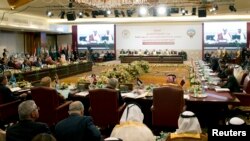DUBAI —
Foreign ministers from across the Arab world have finalized an agenda for the 25th Arab League Summit, which begins Tuesday in Kuwait.
Organizers say the summit comes at a critical time in the region and collaboration among member states is needed to move forward.
One of the most pressing issues is Syria’s civil war, which has claimed around 150,000 lives, according to some estimates, and continues to fuel sectarian tensions in neighboring states.
But after three years of fighting and futile attempts to restore peace, Rice University research fellow Kristian Coates Ulrichsen says it is unlikely the league will be able to coordinate a truce.
"There was a feeling that as in Libya the Arab League was the natural place to start, but I think with the Arab countries themselves divided over whom to support and to what extent, that has made it much more difficult to try and come up with a coherent position on Syria," said Ulrichsen.
Kuwait is holding the league's summit for the first time since becoming a member in 1961. It says bridging regional divides is one of its main aims as host.
The meeting is being held under the slogan “Solidarity for a Better Future.”
Before the talks, Kuwait's Foreign Affairs Minister Sheikh Sabah al-Khaled al-Sabah said Arab solidarity was already “strengthening in many domains.”
The director of research and consultancy at the Dubai-based Institute for Near East and Gulf Military Analysis, Theodore Karasik, says the minister’s claim is an overstatement.
"The title of this year’s conference is one that is completely contradictory to what is ongoing in the region, and I highly doubt that the Arab League is going to be able to put forward a final closing statement that says that the Arab League is unified given so many divisions within member states," he said.
Further division came to light earlier this month when Saudi Arabia, the United Arab Emirates and Bahrain withdrew their ambassadors from Qatar, accusing their Gulf neighbor - which has backed the Muslim Brotherhood - of jeopardizing regional security.
"I am curious, and I think a lot of other people will be curious, if the issue of Qatar and this dispute between Doha and Riyadh and Cairo and the Emirates comes to the forefront of the Arab League meeting," said Karasik. "That will be quite telling of the impact of this squabble within the GCC [Gulf Cooperation Council] on the rest of the MENA [Middle East - North Africa] region.
Analysts like Karasik say divisions among the Gulf states could affect the capability of the Arab League because of the financial flows supporting the organization.
The Arab League was formed in 1945 to strengthen relations among member states and promote the interests of Arabs. Thirteen heads of state have confirmed their attendance for this year’s summit.
Organizers say the summit comes at a critical time in the region and collaboration among member states is needed to move forward.
One of the most pressing issues is Syria’s civil war, which has claimed around 150,000 lives, according to some estimates, and continues to fuel sectarian tensions in neighboring states.
But after three years of fighting and futile attempts to restore peace, Rice University research fellow Kristian Coates Ulrichsen says it is unlikely the league will be able to coordinate a truce.
"There was a feeling that as in Libya the Arab League was the natural place to start, but I think with the Arab countries themselves divided over whom to support and to what extent, that has made it much more difficult to try and come up with a coherent position on Syria," said Ulrichsen.
Kuwait is holding the league's summit for the first time since becoming a member in 1961. It says bridging regional divides is one of its main aims as host.
The meeting is being held under the slogan “Solidarity for a Better Future.”
Before the talks, Kuwait's Foreign Affairs Minister Sheikh Sabah al-Khaled al-Sabah said Arab solidarity was already “strengthening in many domains.”
The director of research and consultancy at the Dubai-based Institute for Near East and Gulf Military Analysis, Theodore Karasik, says the minister’s claim is an overstatement.
"The title of this year’s conference is one that is completely contradictory to what is ongoing in the region, and I highly doubt that the Arab League is going to be able to put forward a final closing statement that says that the Arab League is unified given so many divisions within member states," he said.
Further division came to light earlier this month when Saudi Arabia, the United Arab Emirates and Bahrain withdrew their ambassadors from Qatar, accusing their Gulf neighbor - which has backed the Muslim Brotherhood - of jeopardizing regional security.
"I am curious, and I think a lot of other people will be curious, if the issue of Qatar and this dispute between Doha and Riyadh and Cairo and the Emirates comes to the forefront of the Arab League meeting," said Karasik. "That will be quite telling of the impact of this squabble within the GCC [Gulf Cooperation Council] on the rest of the MENA [Middle East - North Africa] region.
Analysts like Karasik say divisions among the Gulf states could affect the capability of the Arab League because of the financial flows supporting the organization.
The Arab League was formed in 1945 to strengthen relations among member states and promote the interests of Arabs. Thirteen heads of state have confirmed their attendance for this year’s summit.




